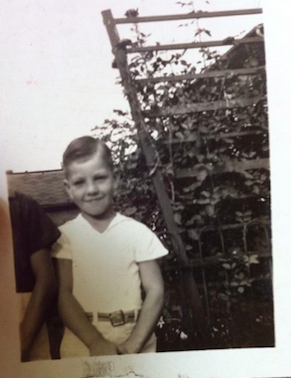
I eat pickles the entire week. Occasionally, I have some chicken salad too, but it is tasteless. The pickles, at least, have so much vinegar, salt, and garlic that I can detect a faint hint of flavor. They crunch, and this, too, gives discernible stimuli. It is not just my taste that is numbed, but my sense of touch is gone too. I get a pedicure that Monday and cannot feel the massage, which is why I spend the money to do this in the first place.
On Tuesday, I speak to my Spiritual Director, and she tells me I am in shock. The lack of taste and feeling signifies that my sympathetic nervous system has kicked into emergency drive, sending most of the blood flow to my essential organs. I am in a dangerous state. One morning, my smoothie tastes awful, but I drink it anyway thinking the strange taste just another symptom of this stranger week. Later, I realize I’d mixed my dog’s liver-flavored greens supplement into it – somehow confusing my own feeding with theirs.
On the second floor of the house, in the master bedroom, my father is dying.
I am in and out of the room countless times each day, two of my sisters come in shifts as they both live hours away and have businesses and families. My third sister will fly from Hawaii as soon as her husband gets through his first week of chemotherapy. I stay the entire time and take care of him.
There is more to do than you would think when someone is dying. Hospice supplies us with an arsenal of narcotics “to keep him comfortable.” One sister later gives this an acronym: DEAD – Drug Em’ And Dead. The pickles are just enough to keep me on my feet. It is June and steaming hot and humid in New Jersey. I keep Dad’s air-conditioner on so he is cool, but the noisy oxygen tank emits it’s own heat, which makes the room hot, and loud, even with the AC. I can’t believe it doesn’t wake him every time I turn it on; it sounds this blaring alarm for 30 seconds— enough to wake the dead, perhaps, but not the barely living.
Although he’s never conscious, I talk to him every day. I wipe his sweaty, cold, clammy, and then burning head. I play and sing Johnny Cash for him, wailing the chorus of “Sunday Morning Coming Down.” One night I sleep beside him and hold his hand.
Every day the pickles remind me I am among the living. The tart and salty combination make my mouth water, and I can not only swallow but taste. I buy them by the quart and eat them whole in two’s and three’s. It occurs to me that there is some irony in my craving for pickles; pregnant women apparently want them, and so, it seems, do those who are death-watching. The pickle may be the quintessential food to usher a soul to and from the body. They’re phallic but green.
On Thursday morning, he goes. My youngest sister is with me, and we hold him together. Both my parents died here in this room – my mother on my father’s watch, my father on mine. I turn the oxygen off and the air-conditioner down, and the next day the heat breaks.
Five years later, over the anniversary of him dying, this week has been glorious. Cool at night with perfect blue skies and low humidity during the day. I write in my journal, reflecting on my Dad’s lousy temper, especially in the heat and humidity. Many times he flipped out commuting on the train when the air-conditioning broke and was ordered to get off before his stop. This went on for decades every summer and is one of the signature stories I tell to illustrate how difficult he often was.
From my journal yesterday:
“The day before the day – five years out. Beautiful these days, much different than the week Dad died. It was so oppressive and humid. Maybe his final days he was back on a train with a broken air-conditioner, having a fit. And then death came disguised as a conductor and threw him off. He was mad as hell, of course, and breathless. But then a low glow rose over the horizon, and he stepped down into a cool wind and my mother’s waiting arms.
“Has this world been so kind to you that you leave with regret?
C.S. Lewis
There are better things ahead than we leave behind.”
